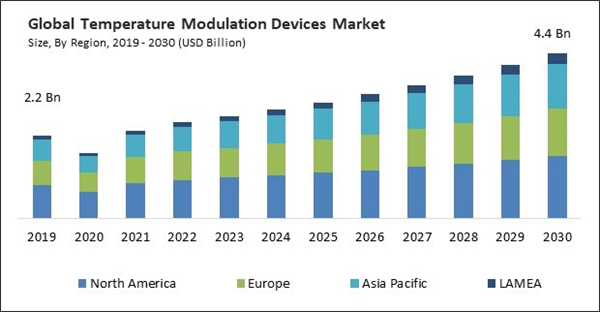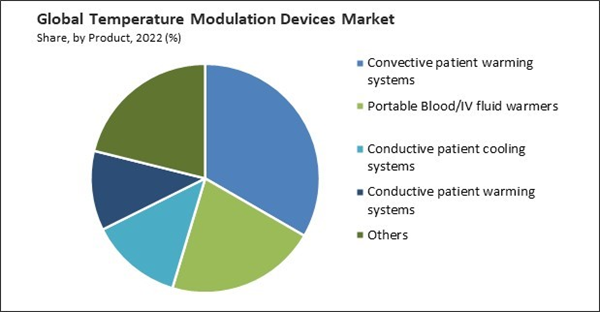The North America region acquired the largest revenue share in the market in 2022. Therefore, North America segment generated $1,028.8 million revenue in the market in 2022. The need for temperature modulation devices is rising in North America as a result of higher defense sector spending as well as higher emergency search and rescue service spending. This region's location causes exceptionally cold weather patterns that make blizzards and heavy snowfall common. Such severe snow/frost-related incidents have been linked to several recorded fatalities. As a result, there will be increased demand in the segment. Some of the factors impacting the market are increasing use in neonatal and pediatric care, rising demand for ambulatory services and Dependency of temperature modulation devices on electricity.
Proper temperature management has a direct correlation with enhanced clinical results. Pediatric patients within their ideal temperature range experience fewer complications, recover more swiftly from medical procedures, and spend less time in the hospital. As a result, they benefit from better clinical outcomes, while healthcare facilities witness reduced healthcare costs associated with longer hospital stays and complications. This complication reduction leads to a more efficient and safer healthcare environment for young patients. Additionally, the increased demand for ambulatory services has fostered cost-effective solutions in patient temperature management. As these services often operate on constrained budgets, the industry has seen the emergence of more affordable yet reliable systems. This has not only made temperature management more accessible for ambulatory providers but has also increased the overall efficiency of outpatient care. Therefore, these factors will drive the expansion of the market in the upcoming years and owing to these factors, the demand for temperature modulation devices will rise.
However, power infrastructure can be unreliable in certain regions, and emergencies or natural disasters can disrupt the electricity supply. This dependence on electrical infrastructure can pose significant challenges where maintaining patient temperature is paramount. Such dependencies become even more critical in settings with limited access to reliable power sources, exacerbating inequities in healthcare access. In conclusion, the dependence on electricity in temperature modulation devices will bring about several negative impacts on the market.
Additionally, the pandemic disrupted global supply chains, affecting the production and distribution of medical equipment, including temperature modulation devices. Shortages and delays in the availability of these systems were observed, potentially impacting patient care. The increased demand for temperature modulation devices, along with the need for other COVID-19-related equipment and resources, placed financial strain on healthcare facilities. This hindered investments in advanced temperature management technologies. The pandemic strained healthcare resources, making it challenging for facilities to allocate sufficient resources to temperature modulation devices. In some cases, these systems were deprioritized in favor of more pressing needs.
Product Outlook
Based on product, the market is divided into portable blood/IV fluid warmers, conductive patient warming systems, convective patient warming systems, conductive patient cooling systems, and others. The conductive patient warming systems segment procured a considerable growth rate in the market in 2022. Conductive patient warming systems are designed to provide warmth directly to the patient through direct contact, typically using conductive materials such as blankets or pads. By reducing the need for excessive heating, these systems can lead to lower operational costs. Therefore, the segment will expand rapidly in the coming years.Regional Outlook
Region-wise, the market is analyzed across North America, Europe, Asia Pacific, and LAMEA. The Asia Pacific region recorded a significant revenue share in the market in 2022. Due to several factors, including the expansion of reputable medical device manufacturers, rising medical costs, greater awareness, and demand from the military and remote emergency healthcare sectors. Furthermore, a few of the main reasons fueling the demand for temperature modulation devices in the Asia Pacific region are the rising number of surgeries brought on by the region's larger population and the increasing frequency of unintentional injuries. Thus, these aspects pose lucrative growth prospects for the segment.The market research report covers the analysis of key stake holders of the market. Key companies profiled in the report include Stryker Corporation, Gentherm Incorporated (Gentherm Medical), Belmont Medical Technologies (Audax Managment Company, LLC), Becton, Dickinson and Company, 3M Company, The Surgical Company, ICU Medical, Inc., Smiths Group plc, General Electric Company and Barkey GmbH & Co. KG.
Scope of the Study
Market Segments Covered in the Report:
By Product- Convective patient warming systems
- Portable Blood/IV fluid warmers
- Conductive patient cooling systems
- Conductive patient warming systems
- Others
- North America
- US
- Canada
- Mexico
- Rest of North America- Europe
- Germany
- UK
- France
- Russia
- Spain
- Italy
- Rest of Europe- Asia Pacific
- China
- Japan
- India
- South Korea
- Singapore
- Malaysia
- Rest of Asia Pacific- LAMEA
- Brazil
- Argentina
- UAE
- Saudi Arabia
- South Africa
- Nigeria
- Rest of LAMEA
Key Market Players
List of Companies Profiled in the Report:
- Stryker Corporation
- Gentherm Incorporated (Gentherm Medical)
- Belmont Medical Technologies (Audax Managment Company, LLC)
- Becton, Dickinson and Company
- 3M Company
- The Surgical Company
- ICU Medical, Inc.
- Smiths Group plc
- General Electric Company
- Barkey GmbH & Co. KG
Unique Offerings
- Exhaustive coverage
- The highest number of Market tables and figures
- Subscription-based model available
- Guaranteed best price
- Assured post sales research support with 10% customization free
Table of Contents
Companies Mentioned
- Stryker Corporation
- Gentherm Incorporated (Gentherm Medical)
- Belmont Medical Technologies (Audax Managment Company, LLC)
- Becton, Dickinson and Company
- 3M Company
- The Surgical Company
- ICU Medical, Inc.
- Smiths Group plc
- General Electric Company
- Barkey GmbH & Co. KG










